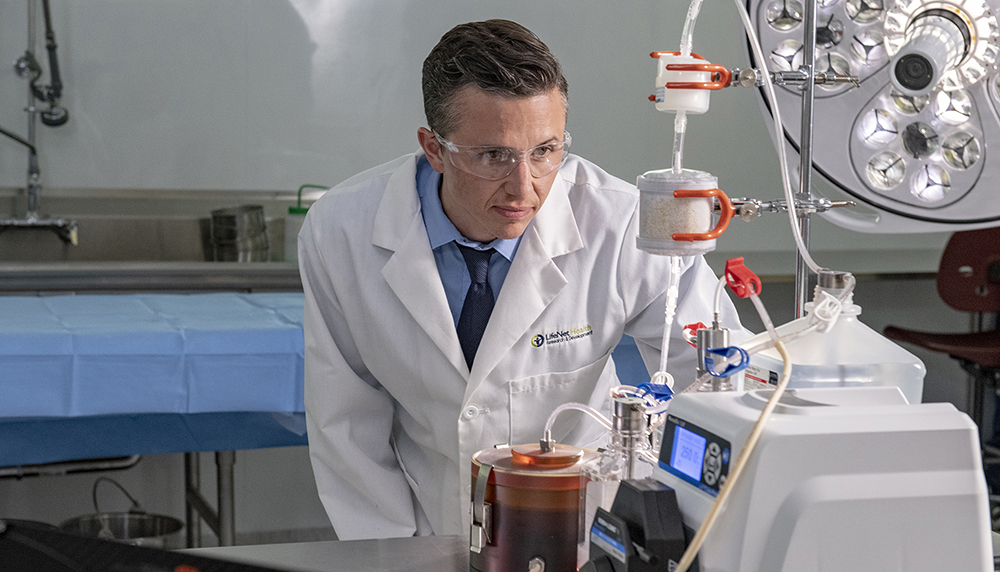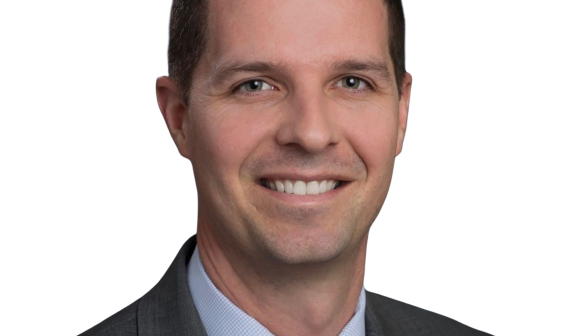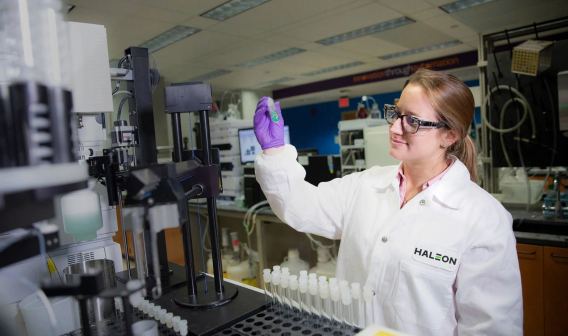Research Partnerships and Treatment Breakthroughs in Hampton Roads
The highly transmissible omicron variant of the novel coronavirus upended perceptions about proper mitigation. People who had been wearing fabric masks began switching over to N95 and KN95 respirators, leading to greater demand for respirators. These respirators get their name from their effectiveness — to earn the N95 classification, a respirator must filter at least 95% of airborne particles, as assessed by the U.S. National Institute for Occupational Safety and Health (NIOSH).
Just 52 companies worldwide have received NIOSH approval to make surgical N95 respirators. One of them is ivWatch, LLC, based in Newport News. ivWatch, which manufactures continuous monitoring systems for early detection of infiltrations during intravenous therapy, added respirators to its repertoire after President and CEO Gary Warren took note of the early-pandemic shortage of personal protective equipment and realized that his company’s equipment, with a few tweaks, could also be used to manufacture high-quality respirators. The company received approval for its masks late last year and is scaling up production.
ivWatch is just one of the companies that make up a robust life sciences industry in the Hampton Roads region. Rich in research activity, the region is home to Eastern Virginia Medical School (EVMS) — where Elizabeth Carr became the first American baby born after being conceived through in vitro fertilization in 1981 — and nonprofit industry leaders such as Operation Smile, which performs free cleft lip and palate repair surgeries around the world, and LifeNet Health, which improves transplant procedures.
LifeNet Health recently completed an expansion of its global headquarters in Virginia Beach and launched its new LifeSciences division to enhance the company’s research. The company has more than 100 global patents for tissue and cell preparation and preservation and is currently building a state-of-the-art tissue processing center with new clean rooms and research facilities.
“Virginia has the opportunity to be a magnet of tissue processing and testing,” said LifeNet Health CEO Rony Thomas.
LifeNet’s tissue bank has become even more vital during the pandemic. Its scientists were able to isolate lung cells for use in vaccine and therapeutic development, allowing pharmaceutical companies to see how various compounds affect different types of cells. That’s just one way Hampton Roads companies are helping drive COVID-19 treatment innovation — in addition, Norfolk-based ReAlta Life Sciences received a $3.2 million Virginia Catalyst grant to evaluate its RLS-0071 compound as a treatment for COVID-related acute lung injury.
Research Powerhouses Drive Medical Breakthroughs
Other Hampton Roads research centers are affiliated with the area’s major educational institutions, notably EVMS, Norfolk State University, and Old Dominion University (ODU), all of which are partnering with local hospital system Sentara Healthcare to form the state-funded Hampton Roads Biomedical Research Consortium (HRBRC).
“The HRBRC embodies what drives and excites me: the challenges of a startup, the pursuit of health equity, community-building, and working with diverse and talented people,” said Kevin Leslie, the partnership’s executive director. “The foundational pieces of a world-class pipeline are in place. Now we finally have the opportunity to coordinate them in earnest.”
Another local university making advancements in life sciences research is Hampton University, home to the Proton Therapy Institute. That facility is now the largest free-standing proton cancer treatment facility in the world. It grew out of Hampton’s medical physics program and the nearby Thomas Jefferson National Accelerator Facility, a U.S. Department of Energy National Laboratory anchored by the Continuous Electron Beam Accelerator Facility, billed as the world’s most advanced particle accelerator.
Virginia has the opportunity to be a magnet of tissue processing and testing.
ODU is home to the Frank Reidy Research Center for Bioelectrics, which conducts interdisciplinary research into the effects of ultra-short pulses and plasma on living matter. John Catravas, a professor at the Reidy Center, and Charlottesville company KeViRx recently received a Small Business Innovation Research grant from the National Institutes of Health (NIH) to support efficacy testing of a new compound against acute and chronic lung injury caused by COVID-19. Catravas has also received NIH funding to develop antidotes for chemically induced inflammation and chronic lung injury. Andrei Pakhomov, the center’s director, is leading a $7.5 million multi-university Air Force Office of Scientific Research grant aimed at using intense electric pulses for non-invasive deep brain stimulation and tumor ablation, while other research deals with membrane biophysics, cancer treatment, immune stimulation, defibrillation, and decontamination.
Reidy Center researchers recently developed a special topical gel using cold plasma technology to more effectively treat chronic wounds and prevent infection. The gel works by breaking up the outer layer of serious wounds. This layer is called biofilm, and it can prevent antibiotics from entering a wound while allowing bacteria to go deeper into the tissue. Michael Kong, professor of bioelectrics at the Reidy Center, describes biofilm in serious wounds as similar to a “castle wall” that can prevent treatments from having the desired effect. Biofilm infections affect 17 million Americans each year, according to NIH data, and kill more than half a million people annually. The gel developed by Kong’s team is currently in clinical trials for safety testing.
A Regional Effort to Help Local Residents
The Hampton Roads region has made a concerted effort to attract life sciences companies, notably through the VABeachBio Accelerator, which is currently accepting applications. The facility sponsors the VABeachBio Innovation Challenge, a competition aimed at solving problems that disproportionately affect veterans. That field has particular relevance in Hampton Roads, home to 15 military installations across all five service branches, more than 90,000 active-duty service members, and nearly 200,000 veterans.
The foundational pieces of a world-class pipeline are in place. Now we finally have the opportunity to coordinate them in earnest.
The city of Virginia Beach, in particular, is courting startups in areas most relevant to veterans, especially those that deal with traumatic brain injuries (TBI). Other area health facilities are covering similar ground — last year, Naval Medical Center Portsmouth opened a new clinic to treat TBI in active-duty personnel.
From research aimed at helping local military personnel to contributions to finding ways to end the global COVID-19 pandemic, the region is making breakthroughs with the potential to improve treatment and quality of life around the world.





